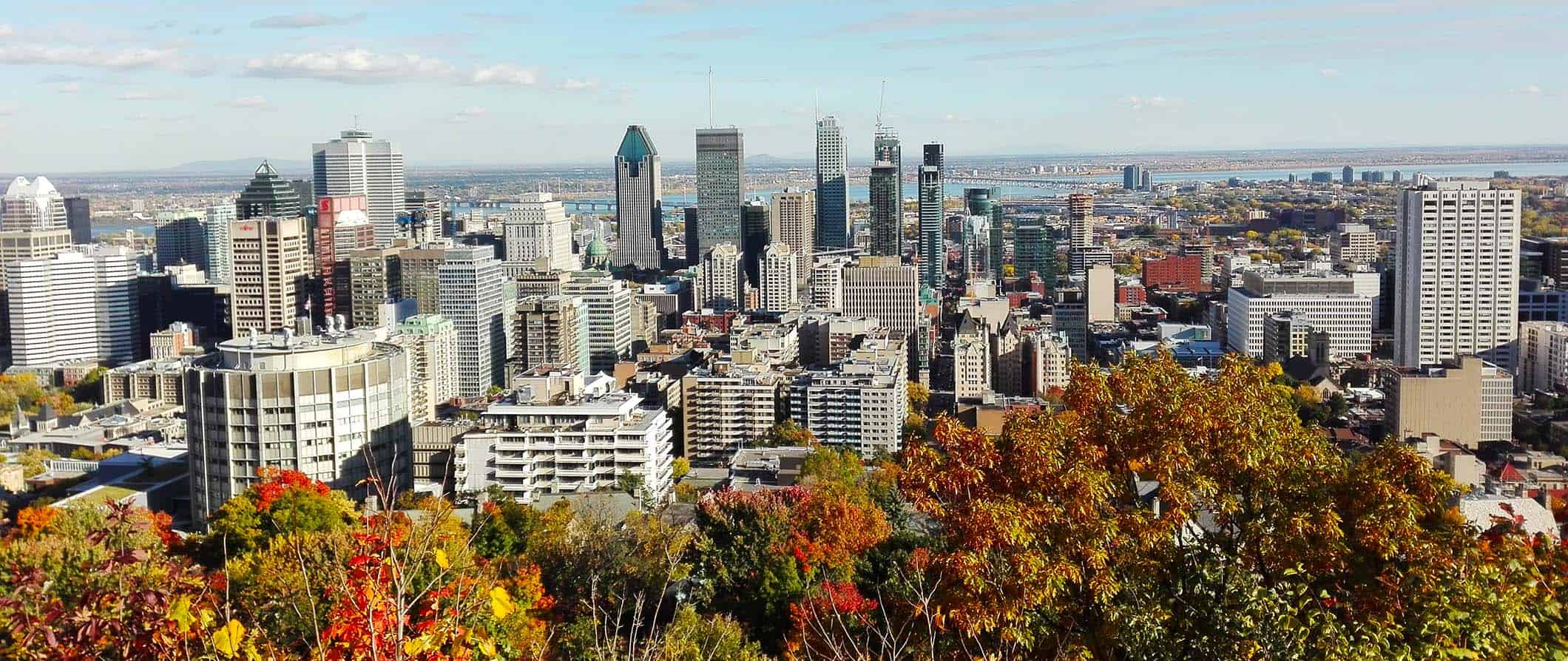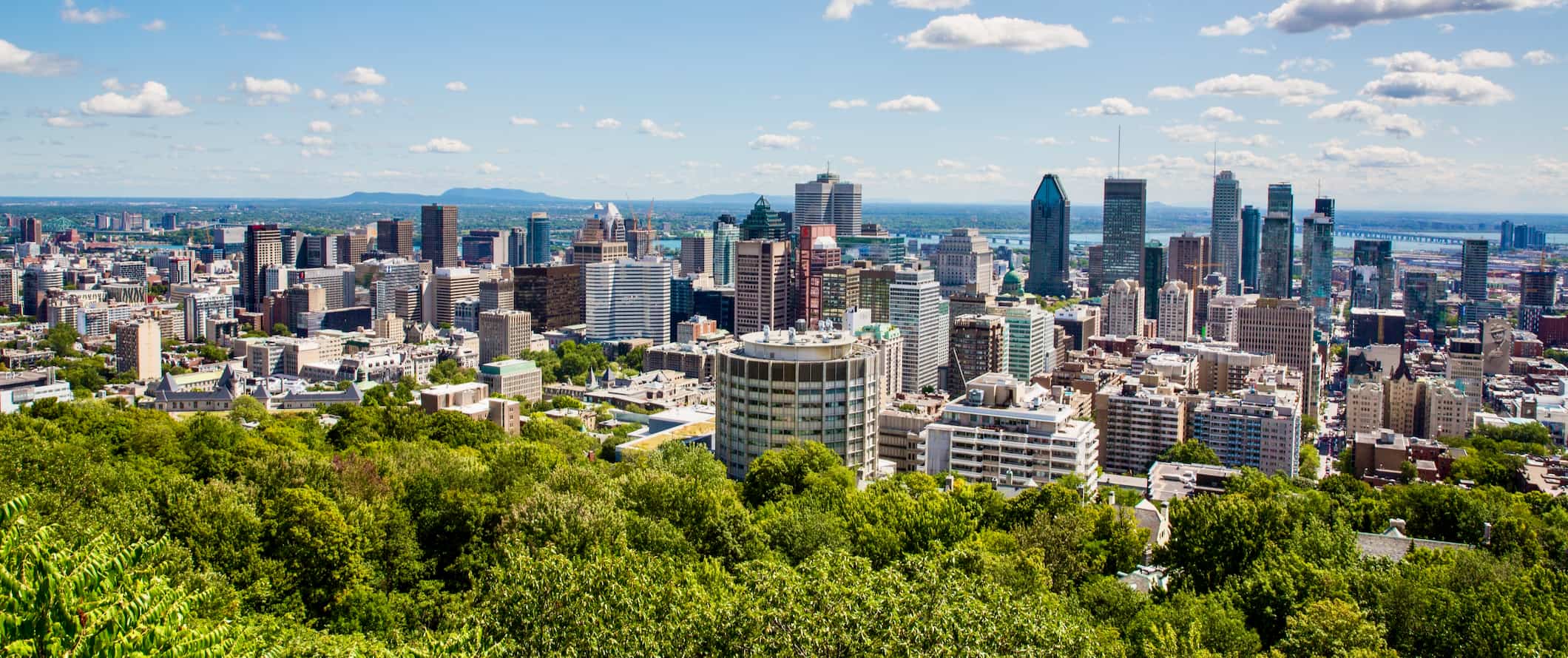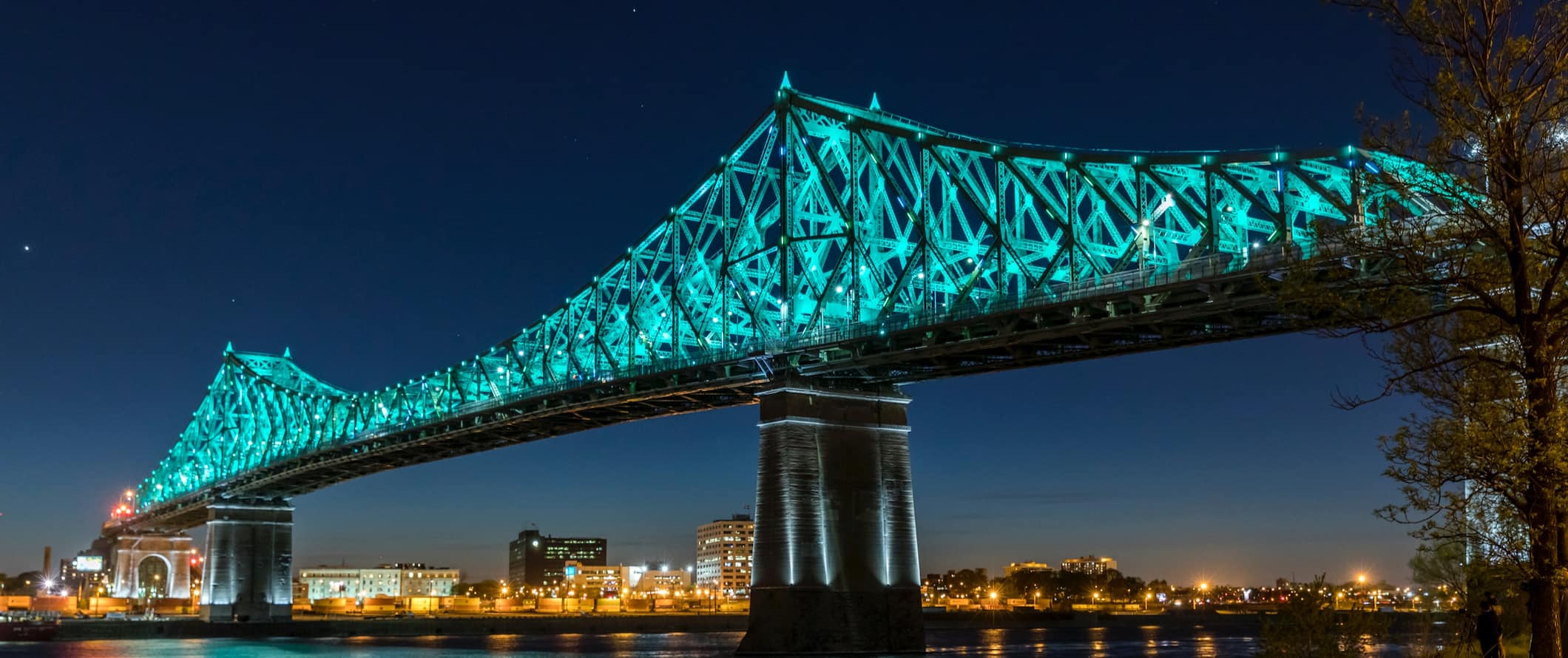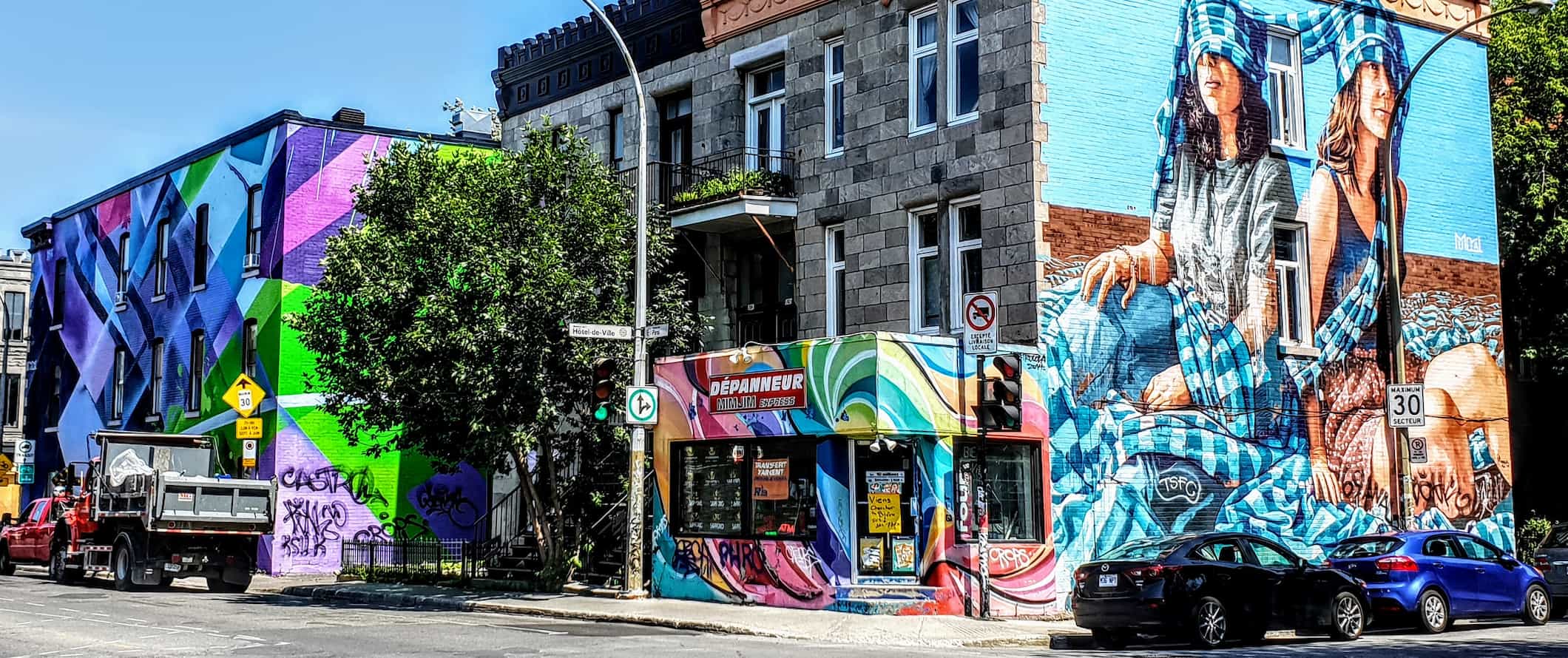

Montreal is Canada’s “European” city. It’s one of the five largest French-speaking cities in the world, and at one point it was even the capital of the country. The second-largest city in the country, it’s charming, historic, and unlike Canada’s other large cities.
Personally, I think it’s one of the best cities in Canada. The city’s Old Town looks like something straight out of medieval France and the French-inspired cuisine and eclectic nightlife (especially the jazz clubs) leave little to dislike. For outdoor explorers, there are a lot of incredible bike paths and nearby mountains to hike to.
I first came here when I was 18 because it was the closest place to where I lived that allowed me to drink (the legal drinking age is 18). Subsequent visits as an adult have only made me appreciate the city on a deeper level and it remains one of my favorites in North America.
It’s also noticeably cheaper than Canada’s other large cities (I’m looking at you Toronto and Vancouver), so there’s good reason to stay awhile and soak up the unique culture.
This travel guide to Montreal can help you plan your trip, save money, and make the most out of your time in this incredible city.

Old Montreal is easily the most attractive part of the city. Its cobblestone streets and historic greystone buildings date back to the 1700s. When people think of Montreal, this is the part of the city they picture. Some of the city’s finest museums and art galleries are here too, including the Montreal Museum of Archaeology and History (admission is 25 CAD). You can also take a Ghost Tour with Get Your Guide for 21.50 CAD.
This is one of three main squares in Old Montreal dating back to the end of the 17th century. Originally used for military events and markets, today it’s a beautiful piece of preserved history. Nearby is the Vieux Séminaire de St-Sulpice, Montreal’s oldest seminary and building (built between 1684-1687) for the Catholic Order of Sulpicians. You’ll also find the majestic Notre-Dame Basilica cathedral here, lauded for being one of the most beautiful churches in North America. Lastly, there is the Bank of Montreal’s founding building, and also the New York Life Insurance skyscraper, constructed in 1888. The plaza is a wonderful place to people-watch and take in the local pace of life.
This beautiful park is one of the highlights of the city and a symbol of the city’s heritage (Montreal comes from ‘Mont Royal’). With 200 acres of lush vegetation, it’s a great place to stroll around or walk up the “mountain” (it’s just a large hill) for fantastic views over the city skyline. On Sundays in the summer, the park comes alive with picnickers and the “Tam-Tams” — an eclectic drum circle that draws huge numbers. The park is open all year round and attracts a broad range of sporting enthusiasts for jogging, skiing, skating, boating, biking, sledding, and more. With so many activities, it’s a great place to spend a sunny day.
The biodome features four distinct ecosystems. You can visit the Tropical Forest, see otters and lynx in the Laurentian Maple Forest, visit the puffins on the Labrador Coast, and explore the volcanic landscape of the Sub-Antarctic Islands. There are over 200 species of animals here and some 750 different species of plants. Admission is 21.50 CAD. It’s especially fun and educational for kids.
This enormous museum has over 43,000 works of art, with many temporary exhibits on rotation as well. There are five intersecting pavilions but the Claire and Marc Bourgie Pavilion is especially worth seeing for its collection of Quebec and Canadian art, including Inuit art. The museum is famous for its community and education collaboration to create unique art experiences as part of its art therapy initiatives. Admission is 24 CAD.
Whenever I visit a new destination, one of the first things I do is take a free walking tour. It’s the best way to see the main sights and connect with a local guide who can answer all your questions. Free Montreal Tours has a comprehensive two-hour tour that covers all the main highlights. Just be sure to tip your guide at the end!
Montreal is home to the second-largest botanical garden in the world. Spanning 185 acres and opened in 1931, it showcases ten indoor greenhouses including a Chinese garden, a Japanese garden, a lily garden, and a rose garden. There’s also a tranquil First Nations Garden designed to represent the natural environment of Quebec’s First Nations, including plants from the Nordic Zone. Admission is 22 CAD. Combined tickets offering discounted rates are available if you also want to visit the Biodome or one of the other museums in the Espace Pour La Vie (Space for Life) natural museum complex. On Thursdays, Planetarium tickets are only 8 CAD after 5pm.
The city’s largest market hosts hundreds of stalls in the middle of Little Italy. Shops and small specialized grocers surround the square, so be on the lookout for Quebecois delicacies like pure maple syrup or ice wine. One of the oldest markets in the city, it’s a great place to have lunch or grab fresh food for later. There are often events like workshops and culinary demonstrations here too, so you never know what you might stumble upon.
On a three-hour guided bike tour with Fitz & Follwell, you’ll visit some of Montreal’s key sites including Old Montreal, Mile-End, Mont Royal, and the Plateau. They also offer themed tours to certain neighborhoods, like the North End, where you’ll explore open-air markets and street art. Bikes and helmets are provided, and the 16-kilometer (10-mile) route has an easy-going pace, making this tour accessible for anyone who can ride a bike. Three-hour tours start at 70 CAD. Ça Roule Montreal on Wheels has four-hour tours for 32 CAD or a full-day rental for 40 CAD (helmet and lock included).
Whether you want to play beach volleyball, tennis, or just have a picnic, Parc La Fontaine is a relaxing spot to kick back and enjoy. This former farm became a public park in the 19th century and has been a beloved community greenspace ever since. In the summer, there are free performances at the outdoor Théâtre de Verdure, while in the winter you can skate on the pond or go cross-country skiing.
This popular neighborhood combines shady residential streets, colorful old Victorian homes, boutique shopping, and trendy restaurants. Walk around and admire the architecture, pop into some antique shops, and keep an eye out for colorful street murals. In the summer, the Ave. du Mont-Royal even transforms into a huge street fair!
Montreal is on an island and there are 234 islands in its vicinity. To explore, you can take different boat tours of the harbor from the Old Town, as well as longer tours of the Lachine Canal and the nearby Boucherville Islands. Along the way, your guide can tell you all about the area’s maritime history. Some tours are limited to 30 passengers, which means you’re never competing for the best view. La Petit Navire offers tours starting at 23.50 CAD for the Old Town tour and 34 CAD for Lachine Canal.
Standing nearly as tall as St. Peter’s in Rome (97 meters/318 feet), this basilica towers over the city skyline. It is one of the most visited shrines in the world, also housing a chapel and a crypt. Canada’s largest church, it’s the final resting spot for Brother André, a simple porter turned miracle worker from the early 1900s who supposedly had healing powers. The architecture is interesting as well, with a Renaissance Revival facade and Art Deco interior. Entry is free and guided tours cost 5 CAD (tours are currently suspended due to COVID-19). The Oratory Museum displaying art and heritage is 3 CAD open daily 10am-4:30pm. You can even stay at the Oratory overnight (55 CAD for a twin room, with breakfast included).
This 17th-century Gothic Revival basilica started as a tiny stone church. Now, it’s a testament to the importance of religion and art in the city’s history (Catholicism is the dominant religion in Quebec). Its dual towers are reminiscent of the cathedral in Paris, and its interior is a stunning display of religious paintings, colorful stained-glass windows, and gold-leaf decorations. There’s also a 7,000-pipe organ inside. You can visit and do a 60-minute self-guided tour for 14 CAD. The award-winning Aura multi-media luminous experience (a light and projection show inside the church) is 34 CAD and has attracted over half a million people from all over the world.
This entertaining drag cabaret is hosted by Mado Lamotte, an iconic diva from the city’s Gay Village. It’s been going on for 30 years and makes for a wild night of music, comedy, costume, and dancing, with guest performers each night. Don’t sit too close to the stage or else you’ll get roasted! Tickets start at 30 CAD.
Made up of two islands, Parc Jean-Drapeau covers 662 acres of green space and contains a racetrack, museums, and even the La Ronde amusement park. The park was the site of the 1967 World’s Fair and today it remains an important event space. Most of the city’s major festivals are held here, including Osheaga, the Canadian Grand Prix, and the Fête des Neiges (a free winter carnival). If you visit during the summer, check out Piknic Électronik, a weekly electronic music festival held each Sunday typically from May to the end of October. Everyone brings a picnic and a bottle of wine! Tickets are 20 CAD.
Montreal is Canada’s food capital. Local Montréal Food Tours has several different food tours around town on which you’ll sample Montreal classics like Montreal bagels as well as poutine, a purely Canadian dish of fries, a gravy-like sauce, and cheese curds. They also have a brewpub tour if you find yourself extra thirsty as you explore. Prices start from 52 CAD for a two-hour tour.
For more information on specific cities in Canada, check out these guides:
Montreal is very safe and you’re unlikely to experience any violent crime here. Your greatest risk is petty crime, like pickpocketing, but even that is rare. Pickpocketing is most likely to occur in busy restaurants and cafes or on public transportation, so keep an eye on your valuables when you’re out and about just to be safe.
Solo female travelers should generally feel safe in the country, however, the standard precautions apply (never leave your drink unattended at the bar, never walk home alone intoxicated, etc.). For more information, check out one of the many solo female travel blogs on the city.
Avoid neighborhoods like Notre Dame Ouest and Wellington Street after dark as sometimes gangs frequent the area.
If visiting in the winter, dress warmly. The temperature can get extremely cold (to the point where people have died).
Scams here are in the city. If you’re worried about them though, you can read about the common travel scams to avoid here.
The number for emergency services is 911.
The most important piece of advice I can offer is to purchase good travel insurance. Travel insurance will protect you against illness, injury, theft, and cancellations. It’s comprehensive protection in case anything goes wrong. I never go on a trip without it as I’ve had to use it many times in the past.
Montreal has lots of hostels that are fun, social, and affordable. Here are some of my suggested places to stay:
For more hostel suggestions, here’s a complete list of my favorite hostels in Montreal!

Some of my favorite restaurants in Montreal include Fairmount Bagels, Damas, Wilensky’s, Le Serpent (for something upscale), La Chilenita, Olive et Gourmando, Main Deli, Sushi Momo, and Drogheria.
This budget assumes you’re staying in a hostel, cooking all your meals, limiting your drinking, walking everywhere or taking public transportation, and doing mostly free activities like hanging out on Mont-Royal and doing free walking tours. If you plan on drinking, add 10-20 CAD to your daily budget.
On a mid-range budget, you can stay in a private Airbnb or private hotel room. You’ll be able to eat out for a few meals, take the occasional taxi, enjoy a couple of drinks, and visit some museums or do a food tour. It’s a comfortable budget.
On this budget, you can stay in a hotel, eat out for all your meals, drink more, take more taxis or rent a car, and do whatever tours or activities you want. This is just the ground floor for luxury though. The sky is the limit!
Montreal isn’t one of the cheapest destinations on the world but there are a lot of ways to cut your spending when you vist, especially if you stick to the free activities. Here are some ways to save money when you visit Montreal:
Bring a water bottle – The tap water here is safe to drink so bring a reusable water bottle to save money. LifeStraw makes a reusable bottle with a built-in filter to ensure your water is always safe and clean.
Stay with a local – If you plan ahead, you can usually find a Couchsurfing host in Montreal. This way, you not only have a free place to stay but you can connect with a local who can share their insider tips.
Take a free walking tour – Walking tours are a great way to get familiar with a city and its culture. Free Montreal Tours offers one that covers all the main highlights. Just remember to tip your guide at the end!
Get the museum pass – A Montréal Museum Pass provides access to over 40 different museums around Montreal. A three-day pass is 75 CAD, while a three-day pass with unlimited transportation is 80 CAD.
Apportez-votre vin – Many restaurants in Montreal have a sign displayed out front that says “Apportez-votre vin” (bring your own wine). You can pick up a cheap bottle of wine at the supermarket and bring it to dinner with you!
Look for free events – Montreal has tons of free events year-round, but especially during the summer. Many of the major music festivals (like the Montreal International Jazz Festival, the largest jazz festival in the world) have free concerts or shows in the streets. There are also free art shows, theatrical performances, and even stand-up comedy (the annual Just For Laughs comedy festival is the largest comedy festival in the world). Mtl.org lists all events!
Check out Montreal Sweet Deals – Mtl.org also has a selection of “Sweet Deals,” where if you book a room with one of the partner hotels directly, you’ll get special perks like late departure, breakfast included, or a discounted room rate (sometimes up to 30% off).
Eat at Montreal’s Food Markets – Head to Jean-Talon market in Little Italy, the largest open-air market in North America for a unique experience and stock up on fresh food items. There are also many eateries and places to get a snack or a full meal whether you’re in the mood for tacos, mozzarella sticks, crepes, ice cream, or oysters.
Pick up a Passeport MTL – Much like the museum pass above, the official city pass, Passeport MTL, lets you choose admission to five attractions from a list of over 28 attractions when you buy a card. The card also includes discounted offers to other attractions too. It’s 95 CAD.

Public transportation – Montreal’s bus service covers the entire city center and the outskirts of town, including the airport. It’s 3.50 CAD for one ride or 6.50 CAD for a return trip. An unlimited day pass is 11 CAD, which is your best option. You can use your tickets on the subway as well, which is the best way to get around the city.
If you’d like to be able to top up your transit card, purchase an OPUS card for 6 CAD.
You can take bus 747 to and from the airport for 11 CAD each way.
Taxi – Taxis are not cheap here. Their base rate is 4.05 CAD and it’s an additional 1.75 CAD per kilometer afterward. Skip the taxis if you can as prices add up fast!
Ridesharing – Uber is available in Montreal and is a bit cheaper than taxis, however, it’s still much more expensive than public transportation and likely not much faster if you’re downtown.
Bicycle – Montreal is very bike-city friendly and there are plenty of bicycle rental businesses around town. The public bike rental system is Bixi Bike. It costs 50 cents to unlock a bike, and then 10 cents/per minute for a regular bike or 12 cents/per minute for an e-bike. With over 8,000 bikes available at 700 stations across the city, you can easily hop around the city by bike. If you purchase an OPUS transit pass, you can link it to Bixi Bike to easily tap and rent a bike, as well as receive 10% off fares.
Car rentals – Car rentals start at 60 CAD per day for a multi-day rental. However, I wouldn’t suggest renting one here as parking is expensive and you’ll get around much faster by subway and bus. For the best car rental prices, use Discover Cars.
Montreal is at its busiest in the summer, especially when all the outdoor patios are open and there’s a festival practically every week. July and August are the hottest months, with temperatures hovering around 25°C (78°F). Just note that accommodation prices increase and tourist attractions can get crowded during this time so you may want to book early.
Both early fall and late spring are excellent times to visit as the weather is warm, you can do all the outdoor exploration you want, and there aren’t many tourists around. It’s stunning from late September to the end of October when the leaves start turning color.
Winters in Montreal are bitterly cold, with temperatures averaging around -7°C (19°F) in January though it can get much colder. Expect lots of snow too. In short, I wouldn’t suggest visiting in the winter unless you’re heading further afield to ski and enjoy the snow.
These are my favorite companies to use when I travel. They consistently have the best deals, offer world-class customer service and great value, and overall, are better than their competitors. They are the companies I use the most and are always the starting point in my search for travel deals.
Want more tips for your trip? Check out all the articles I’ve written on Montreal travel and continue planning your trip: